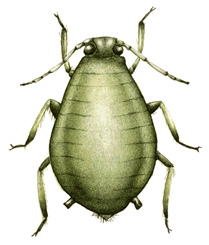Aphid, << AY fihd or AF ihd, >> also called plant louse, is a tiny, soft-bodied insect that feeds on plant juices. There are thousands of species (kinds) of aphids. Many kinds of aphids are harmful to gardens, orchards, and farm crops. They have plump bodies, small heads, and mouths shaped into tubes. They use the tubes to pierce plant stems or leaves and feed on the juices. Aphids may be green, black, whitish, or other colors. Many kinds of aphids have four wings. Others are wingless.

Most kinds of aphids produce a sweet fluid called honeydew. This fluid is one of the favorite foods of the ant. The ant licks up the honeydew as it pours out of tube-shaped organs called cornicles at the tip of the aphid’s body. To have plenty of honeydew, ants take good care of some kinds of aphids. They move the aphids from one plant to another and may infest an entire garden.
Aphids multiply rapidly. The males and females mate in the fall. The females lay fertilized eggs that hatch the following spring. These young aphids do not mate and lay eggs. They give birth to living young hatched from unfertilized eggs within their bodies. During summer, many generations of fatherless aphids are born by this process, called parthenogenesis. In fall, adult males and females appear, and the life process repeats. Spiders, ladybugs, and lacewings feed on aphids.
